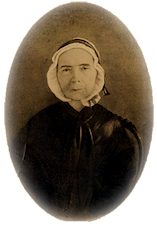Chantilly, June 1.—We came here (the house of our friend Mrs. S.) this morning, after some hours of feverish excitement. About three o’clock in the night we were aroused by a volley of musketry not far from our windows. Every human being in the house sprang up at once. We soon saw by the moonlight a body of cavalry moving up the street, and as they passed below our window (we were in the upper end of the village) we distinctly heard the commander’s order, “Halt.” They again proceeded a few paces, turned and approached slowly, and as softly as though every horse were shod with velvet. In a few moments there was another volley, the firing rapid, and to my unpractised ear there seemed a discharge of a thousand muskets. Then came the same body of cavalry rushing by in wild disorder. Oaths loud and deep were heard from the commander. They again formed, and rode quite rapidly into the village. Another volley, and another, then such a rushing as I never witnessed. The cavalry strained by, the commander calling out “Halt, halt,” with curses and imprecations. On, on they went, nor did they stop. While the balls were flying, I stood riveted to the window, unconscious of danger. When I was forced away, I took refuge in the front yard. Mrs. B. was there before me, and we witnessed the disorderly retreat of eighty-five of the Second United States Cavalry (regulars) before a much smaller body of our raw recruits. They had been sent from Arlington, we suppose, to reconnoitre. They advanced on the village at full speed, into the cross-street by the hotel and court-house, then wheeled to the right, down by the Episcopal church. We could only oppose them with the Warrenton Rifles, as for some reason the cavalry could not be rendered effective. Colonel Ewell, who happened to be there, arranged the Rifles, and I think a few dismounted cavalry, on either side of the street, behind the fence, so as to make it a kind of breastwork, whence they returned the enemy’s fire most effectively. Then came the terrible suspense; all was confusion on the street, and it was not yet quite light. One of our gentlemen soon came in with the sad report that Captain Marr of the Warrenton Rifles, a young officer of great promise, was found dead. The gallant Rifles were exulting in their success, until it was whispered that their captain was missing. Had he been captured? Too soon the uncertainty was ended, and their exultant shouts hushed. His body was found in the high grass—dead, quite dead. Two of our men received slight flesh wounds. The enemy carried off their dead and wounded. We captured four men and three horses. Seven of their horses were left dead on the roadside. They also dropped a number of arms, which were picked up by our men. After having talked the matter over, we were getting quite composed, and thought we had nothing more to fear, when we observed them placing sentinels in Mr. B.’s porch, saying that it was a high point, and another raid was expected. The gentlemen immediately ordered the carriages, and in half an hour Mr. B’s family and ourselves were on our way to this place. As we approached the house, after a ride of six miles, the whole family came out to receive us. L. and B. ran across the lawn to meet us, with exclamations of pleasure at seeing us. We were soon seated in the parlour, surrounded by every thing that was delightful—Mrs. S. all kindness, and her daughters making the house pleasant and attractive. It was indeed a haven of rest to us after the noise and tumult of the court-house. They were, of course, in great excitement, having heard wild stories of the fight. We all rejoiced, and returned thanks to God that he had enabled our men to drive off the invaders.
This evening we have been enjoying a walk about these lovely grounds. Nature and art have combined to make it one of the most beautiful spots I ever saw–” So clean, so green, so flowery, so bowery,” as Hannah More wrote of Hampstead; and we look on it sadly, fearing that the “trail of the serpent may pass over it all.” Can it be that other beautiful homes are to be deserted? The ladies of the family are here alone, the sons are where they should be, in the camp; and should the Northern army sweep over it, they cannot remain here. It is pitiful to think of it. They all look so happy together, and then if they go they must be scattered. Colonel Gregg and others of a South Carolina regiment dined here yesterday. They are in fine spirits, and very sanguine.
